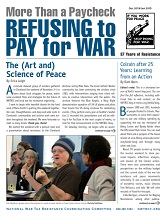 More Than a Paycheck,
More Than a Paycheck,
REFUSING to PAY for WAR
December 2018 – January 2019
Contents
- The (Art and) Science of Peace by Erica Leigh
- Colrain after 25 Years: Learning from an Action
By Ruth Benn - Counseling Notes Lock-In Letters • Passport Renewals & Revocations • Resources
- Many Thanks to everyone who supports NWTRCC with their volunteer time or financial donations and to the following groups for recent donations
- Network List Updates
- War Tax Resistance Ideas and Actions School of the Americas Watch Border Encuentro 2018 Report • Annual Maine War Tax Resistance Gathering Report • Peace Week 2018 San Diego
- NWTRCC News Coordinating Committee Decisions at the November Gathering • More on Consultant Changes • Help keep NWTRCC Strong and Growing! Nominations Open for NWTRCC’s Administrative Committee (AdComm) • Thanks to Lakeside Press
- PROFILE However Small It May Seem By Joshua Weresch
Click here to download a PDF of the December/January issue
The (Art and) Science of Peace
By Erica Leigh
A convivial stalwart group of resisters gathered in Cleveland the weekend of November 2-4 to learn about local struggles for peace, watch some excellent films and strategize for the future of NWTRCC and local war tax resistance organizing.
I want to begin with heartfelt thanks for the hard work of Maria Smith in putting this weekend together. Her care, thoughtfulness, and deep and wide roots in Cleveland’s communities and activist work were evident throughout the weekend. We were fortunate to meet so many locals. Thank you, Maria!
We started the weekend with a potluck meal and a presentation about resistance to the Cleveland Airshow, led by Mike Fiala. The local Catholic Worker community has been protesting the airshow since 1985, with interventions ranging from silent witness to creative interactions with the public. The airshow features the Blue Angels, a Navy flight demonstration squadron of F/A-18 planes and pilots that travels the US doing airshows for celebratory events. (They perform every year at Seattle’s Seafair too.) I recorded this presentation and will be editing it for YouTube in the next couple of weeks, so look for that announcement on the NWTRCC blog.
On Saturday morning, we began with an assortment of small group strategic discussions. We primarily addressed fundraising for NWTRCC and methods of reaching out to individuals and groups about war tax resistance. Some very good ideas for future NWTRCC work and work by affiliates came out of this discussion. Special thanks to Lincoln for coming up with the discussion plan — it worked great!
We had a delicious catered lunch and discussion with local caterers who also cater for community dinners for cross-cultural/cross-racial community building.
In the afternoon we watched a very special screening of the upcoming film The Pacifist, of which war tax resister Larry Bassett is the subject. The film is beautifully shot and takes the viewer through Larry’s journey of conscience as he refuses to pay over $100,000 in taxes. We were glad to have Larry joining us by computer after the screening so we could ask him some questions about his resistance and how it’s affected his life, his kids, and other circumstances! While the film isn’t yet available to the public, an audio version of the film is FREE online through the Spotify and Apple Music audio streaming services. You can also watch a scene from the movie at facebook.com/thepacifistfilm.
After that, Patt Needham of the Cleveland Nonviolence Network talked about the group’s work to get a science exhibit on peace from a neurological perspective installed at the local Great Lakes Science Center, and there was a discussion about ways to appeal to the science center and angles for the exhibit to take.
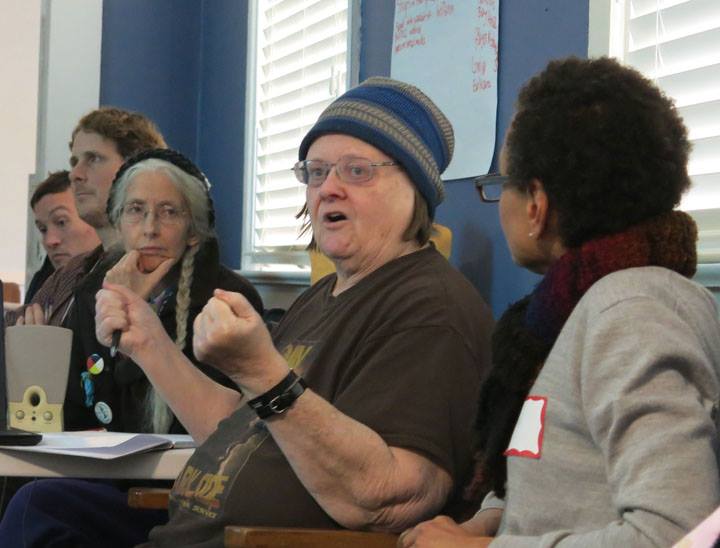
Patt Needham speaks about the proposal to create a peace exhibit at Great Lakes Science Center. Photo by Ruth Benn.
And on Saturday night, we watched the film Dispatches from Cleveland, which centers around the police killing of 12-year-old Tamir Rice in Cleveland in 2014. The beautifully shot film also explores foreclosures, racism, lack of economic opportunity, and other closely related issues affecting East Cleveland communities. Maria Smith facilitated an animated Q&A period with local activists Genevieve Mitchell and Cherima Chungag about racism, militarism, and poverty.
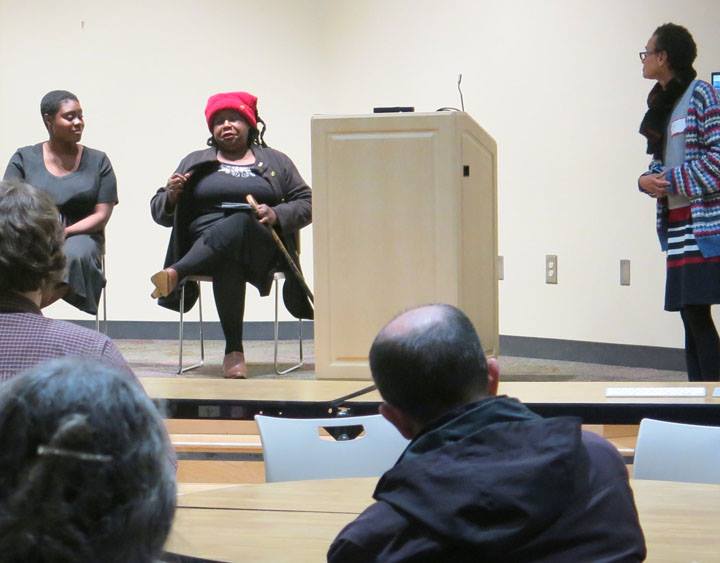
Community activists Cherima Chungag (left) and Genevieve Mitchell (center) responded to the film “Dispatches from Cleveland.” Maria Smith (right) hosted the evening. Photo by Ruth Benn
See NWTRCC News for a summary of the business meeting decisions on Sunday morning, and how some of those decisions will impact our work going forward!
On Sunday afternoon, we had a session for war tax resistance counselors, discussing a variety of issues around counseling philosophies. We particularly focused on the difference between directive and non-directive counseling. We also discussed the idea of creating some sort of support group for people who want to take action about war, which would include education, group discussion, and commitment to some sort of action against militarism (such as, but not limited to, war tax resistance) at the end of a planned series of sessions. I was also interested in our discussion about the differences between technical and motivational counseling (giving details of filing, deductions, and potential IRS enforcement actions versus focusing on someone’s motivation for considering WTR and motivations behind what actions they might want to take). I hope that we’ll have a lot more to say on this subject in the coming weeks and months!
Although the WTR-related activities during the weekend were not as well attended as many of us would have liked, it was well organized and had a variety of satisfying activities and discussions. And we had 25-30 people at each of our evening events, including local activists and WTRs. As usual, I came away with a lot of ideas bouncing around my head for what to do next, especially as I wrap up my paid work for NWTRCC.
It was great to see you all! Till next time.
Colrain after 25 Years: Learning from an Action
By Ruth Benn
Editor’s note: This is a shortened version of Ruth’s recent blog post. You can find the full reflection, including additional links to web content, on the NWTRCC blog at nwtrcc.org/media/blog.
Between 1989 and 1993, hundreds of people flocked to Colrain, Massachusetts, to voice their opposition to war and military spending by supporting the war tax resistance of Betsy Corner and Randy Kehler when the IRS seized their home. You can read about them and a synopsis of the house seizure at scua.library.umass.edu/umarmot/kehler-randy and through many other web links.
About 50 people turned up during the reunion weekend to share personal impacts, reflections, analysis, and lessons of the Colrain action. There were also presentations and perspectives on the military budget and the current state of the war tax resistance and peace movements nationally. It was a packed weekend of wonderful stories, music (thanks Tom Neilson), and talk. We left with mounds of food-for-thought.
Frida Berrigan, columnist for Waging Nonviolence, among other publications, started the weekend off with a presentation about the ever-bloated military budget, or as weekend organizer Bob Bady likes to call it, “the brontosaurus in the living room that nobody talks about.”
Bob Bady was a key organizer behind the Colrain actions that took place under the banner of “It’s wrong to confiscate homes in order to force people to pay for war.” His house had also been seized and auctioned, but the buyer never attempted to take it over. Bob started off the Saturday morning sessions with a timeline from the house seizure in March 1989, through two auctions and sale to a young couple, Danny Franklin and Terry Charnesky (now Franklin), to the actual eviction of the Kehler-Corners in December 1991, to when the couple and their baby moved in April 1992, and the resulting vigil and occupation at and around the house. The Colrain action turned into the longest and most remarkable war tax protest in U.S. history. During the 18-month occupation there were 60 arrests (usually for being on the property when ordered off) involving 52 people who spent five days to two weeks in jail. The final arrests were in September 1993 after a court-ordered injunction forced the end of the occupation.
Then a panel of very involved Colrain-area participants talked about what the action meant to them at the time and how they look back on it now.
The afternoon was spent with a deeper analysis. Those who participated most closely in decision-making and strategy through the Occupation Support Committee reflected on the goals and process, where goals were met, adjustments made, or when actions failed to meet goals and principles. Perhaps everyone agreed that the support action up to the point where the Franklins moved into the house was pretty unified. After they moved in, meetings and strategizing were more difficult. Some supporters drifted away; there were times when the vigil was faced with violent acts and threats of violence; and there was conflict within the support community about whether the action was too much against the family and losing focus on losing the house as a consequence of refusing to pay for war. But the core group stuck together through all their differences. As Aaron Falbel said, “I learned that nonviolent people could disagree.”
This reflection cannot end without giving some description of the most moving session of the weekend. For most of us who went up to the action one or two times, followed it from afar, and/or “saw the movie” (An Act of Conscience), we knew that the land trust finally settled with the Franklins. They moved out at the end of 1994, and the land trust took control over the house. Randy and Betsy moved into a home with Betsy’s mother on land trust property where they live today.
What many of us did not know was that a relationship had been established with Terry Franklin that would develop over the following years as some of the participants in the action saw her in town or found their children going to the same school. When WTR support committee participant Mary Link heard that the Franklin family was in a difficult way, she and others stepped up to help out. Terry wrote a thank you note and said, “When I think about Colrain, I kept wondering why I had to go through that, and now I know, because a harder time would come and I was going to need you.”
Terry said that when she was asked to come to the weekend she said “yes” without hesitation. She has run into Betsy over the years and found that Betsy “never treated me as ‘the bad person who bought the house.’ ”
There was much laughter in this session, along with tears, gratitude, and deeper reflection all around. (Again, see the blog for much more detail about this session.)
The Sunday panel of WTRs and organizers Bill Ramsey, Ruth Benn, Larry Rosenwald, and Joanne Sheehan gave perspectives on “the impacts Colrain might have had on the national WTR movement and the current state of that movement.” We covered how it inspired us and also some of the negative impacts for potential resisters. The background question for much of the weekend was, “Why didn’t this action create the big movement we thought it would?” It was a powerful and sustained action with broad support. but many other factors affect movement-building.
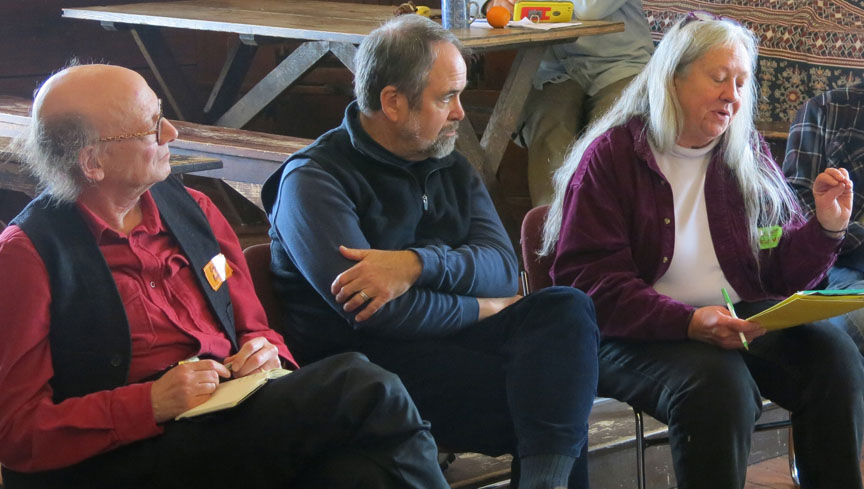
Larry Rosenwald (left), Bill Ramsey (center), and Joanne Sheehan (right) speak during the Sunday panel discussion of the impacts of Colrain. Photo by Ruth Benn (also a panelist).
Larry spoke about WTR as an individual act of conscience: we “do what we are led to do” but that does not create a movement. He noted that WTR lacks a shared discipline, with maybe too much focus on “conscience” and “war” with so many other movements highlighting other reasons to refuse taxes. (You can read his full comments at bit.ly/lrosenwald-colrain.)
I mentioned hearing stories about and knowing that there are way more conscientious tax resisters than we know about, but that it seems impossible to capture that energy into a movement.
Joanne talked about the many movements that are active now, but she finds that those activists talk about nonviolence very differently than we do. They don’t look at the principles and lifestyle, so much as the tactics. We see the intersection of issues but to really make the connections with other activists we have to build relationships. We have to work with people side-by-side.
If you’ve read this far you can probably see that there is a lot to say about this weekend. There are voice recordings that should become available before long. Having listened to some of these sessions again, I think they will be well worth listening to for those of you who were not there in person. And others will write about the things that stood out to them. Hopefully it will add up to continued dialogue — and then maybe more unified actions — to carry on our war tax resistance and to build that movement to cut military spending and use that money for all the desperate needs we see around us and hear about every day.
Counseling Notes:
Lock-In Letters
A war tax resister recently notified us that his employer had received a lock-in letter. This resister began practicing WTR in 2016 by increasing the allowances on his W-4 (also known as W-4 resistance). The IRS sends a lock-in letter to an employer when the IRS determines that an employee does not have enough federal income tax withholding to cover taxes owed. The notice specifies the maximum number of withholding allowances permitted for the employee. Often, the IRS lock-in letter lowers the employee’s withholding to zero. Unless a resister is being claimed on another person’s tax return (e.g., by a parent), most resisters should be able to claim at least one allowance, if not more.
With the lock-in letter, the employer receives a copy of the letter to give to the employee that identifies the maximum number of withholding allowances permitted and the process by which the employee can provide additional information to the IRS to determine the appropriate number of withholding allowances. Please follow this process to appeal the number of allowances if it is too low. The employee can submit a new Form W-4 and a statement supporting the claims made on the Form W-4 to the IRS office designated on the lock-in letter.
In the past when resisters received a lock-in letter, it was usually accompanied by a wage garnishment. In this most recent instance, the lock-in letter did not include any wage garnishment. The reason that the resister only received the lock-in letter is unknown. Perhaps it requires less work on the part of the IRS.
Passport Renewals & Revocations
As previously noted, the IRS may inform the State Department not to renew passports for those with a tax debt over $51,000. Those in this situation may even have their passport revoked. At the end of November, we know of two folks that have received notice from the IRS that the IRS had notified the State Department not to renew their passports. One person may not be a WTR, but the other person is Larry Bassett, who received his notice in early October. As previously reported in this newsletter, Larry is resisting (and has redirected) $128,005 of federal income taxes for 2016, which resulted from a $1 million inheritance he received after the passing of his father.
As always, please notify the NWTRCC office if the IRS sends you either of the above notices or interacts with you in any manner out of the ordinary.
Resources
With support from the Outreach Committee, we’ve added stories from some recent creative Tax Day actions, as well as revised organizing tips, on NWTRCC’s Tax Day Action Ideas page. Start thinking about your Tax Day events now! Check out the updated page at:
nwtrcc.org/programs-events/action-ideas.
Many Thanks
Thanks to each of you who has responded to our November appeal—and in advance to each of you who is about to send that check! Remember, you can also donate online through Paypal (not tax deductible) or Resist (tax deductible) by clicking on the “Donate” button at nwtrcc.org. (Please let the NWTRCC office know if you use Resist.)
Thank you to Milwaukeeans Michael Komba & Laura Pope, who helped Lincoln stuff envelopes for the November appeal.
The November 2018 NWTRCC conference was in Cleveland. Thanks to Maria Smith of Cleveland for all her hard work in finding a venue and bringing us into contact with so many folks doing important peace & justice work in Cleveland.
We are very grateful to these alternative funds and WTR groups for their redirections and Affiliate dues:
War Resisters League
Network List Updates
The Network List of Affiliates, Area Contacts, Counselors, and Alternative Funds is being updated this Fall. The latest list is online at nwtrcc.org, or contact the NWTRCC office (nwtrcc@nwtrcc.org or (800) 269-7464), if you would like a printed list by mail.
Don’t forget, you can find us on
Facebook • Twitter • YouTube • Instagram
or join our discussion listserve
Advertise to Activists! See the advertising rates for this newsletter or contact the editor at (800) 269‒7464.
Consider a Bequest
A bequest costs nothing now, yet it may give you great satisfaction to know that your gift will live on in NWTRCC. Simply name NWTRCC as the beneficiary of a portion of your estate or of particular assets in your estate, or contact NWTRCC for arrangements through one of our 501c3 fiscal sponsors: (800) 269-7464 or nwtrcc@nwtrcc.org.
War Tax Resistance Ideas and Actions
School of the Americas Watch Border Encuentro 2018 Report
The Encuentro for me is an emotional trapeze — intense as it interweaves really scary news with soaring art and reconnections with friends. The 2018 SOAW border convergence drew hundreds from both the U.S. and Mexico for the third year.
Groups began to arrive on Wednesday for pre-Encuentro actions. Some attended the second trial of Border Patrol Agent Lonnie Schwartz for the murder of 16-year old Jose Antonio Elena Rodriguez in Tuscon; others attended ICE hearings; and folks interested in direct action attended trainings.
Our first stop Friday afternoon was at the SOAW protest at MilCorp, an armaments manufacturer in Tucson. Over 250 people carried signs and chanted outside this long-standing local arms manufacturer. Police were a heavy presence, as usual, to “keep you safe.” The barrage of cop cars managed did a great job of obstructing traffic, annoying rush hour drivers to no end.
As the sun set, we all caravanned to the isolated Eloy Detention Center, the largest and deadliest migrant detention center in the country, to let those inside know they were not forgotten. We were reminded we were on traditional lands of the Tohono O’odham peoples, split by the border and separated by a wall. A young speaker shared her experiences of two detentions inside the facility, and I suddenly remembered her — she was one of the tireless Mijente coordinators I met during the San Diego ICE protests 6 months earlier.
The town of Nogales is split in two by the U.S./Mexican border. The US side is more depressed, quiet with closed shops everywhere. Cross the border into the Sonoran side and you are surrounded by lively small businesses and food vendors everywhere.
This year, NWTRCC tabled on the southern side of Nogales in the Mexican state of Sonora. So the Spanish NWTRCC literature was grabbed up. Our space was just steps away from the somber memorial for 16-year old Tonio, shot 10 times by a Border Patrol agent from the U.S. side of the omnipresent wall. I met several ex-WTRs who were looking to re-up after the recent Trump follies. Students from Earlham College also came over to investigate our materials, and I suggested they look up Lonnie Valentine [editor’s note: professor at Earlham and host of our November 2014 gathering there] when they return to Indiana.
Workshops took place on Saturday on both sides of the border. This year, the main stage was only on the Sonoran side due to heavy-handed U.S. Border Patrol (BP). BP had cordoned off the area used the past two years for the main stage on our side of the border, extending the “no-man’s land” border militarization. I often think the border is meant to keep “us” in, rather than “them” out, in a kind of mind-control of US residents. The border “no-man’s land” keeps intruding further and further into our country as BP power increases.
Strangely, every time I crossed into Mexico, my phone went black so I was unable to photograph much of what happened. You can see great reports and updates at soaw.org and
facebook.com/schooloftheamericaswatch
— Anne Barron
Annual Maine War Tax Resistance Gathering Report
“Taking Back Our Tax Dollars from War Makers — Using Our Money for Our Priorities” was the focus of the annual Maine War Tax Resistance Resource Center’s (MWTRRC) program at Portland’s University of
Southern Maine (USM) on October 27.
The “Divest Yourself and Institutions from the Military Industrial Complex” panel was led by Jason Rawn, one of the organizers of the Maine Peace Walk. Jason reports: “Our workshop on divesting from war took a brief look at successful campaigns, including divesting from South African apartheid, student-led fossil fuel divestment, and BDS campaigns against the state of Israel. We discussed the possibilities of mass student debt non-repayment, as well as actions around divesting pension funds of investments in war making corporations. (One participant, discussing her Union and retirement benefits, stated elliptically, “If before I die I can radicalize Maine’s teachers…”) As a next step, we have received an offer of a meeting with the president of one of Maine’s colleges to discuss their divestment from fossil fuels and its effects on the school’s portfolio.
The “Support for Seasoned War Tax Resisters” workshop was led by Ginny Schneider, the coordinator of the MWTRRC. This workshop provided support for longer-term WTRs. We discussed individual circumstances and ways that WTRs could get their house in order, so to speak, related to their taxes.
The main panel discussion, “Using Our Money for Our Priorities: Taking Back Our Tax Dollars from War Makers,” was moderated by Leslie Manning, a Quaker and former president of the Maine Council of Churches. Panelists were:
- Georges Budagu Makoko, a member of the Banyamulenge, a Tutsi tribe, and originally from the Kivu province of Eastern Democratic Republic of the Congo. After barely surviving the atrocities in the region, he was granted asylum in the U.S.. He spoke on the connection between immigration and war.
- Lisa Savage, a WTR, teacher and leader of the Maine Natural Guard campaign, which connects the dots between climate change and the Pentagon’s giant carbon boot print. She spoke on state and local taxes underwriting General Dynamics’ nuclear shipbuilding in Maine.
- Bob Klotz, who has worked in healthcare for 40 years. He is a longstanding anti-war activist and also co-founded 350 Maine. He spoke about the connection between the climate and war.
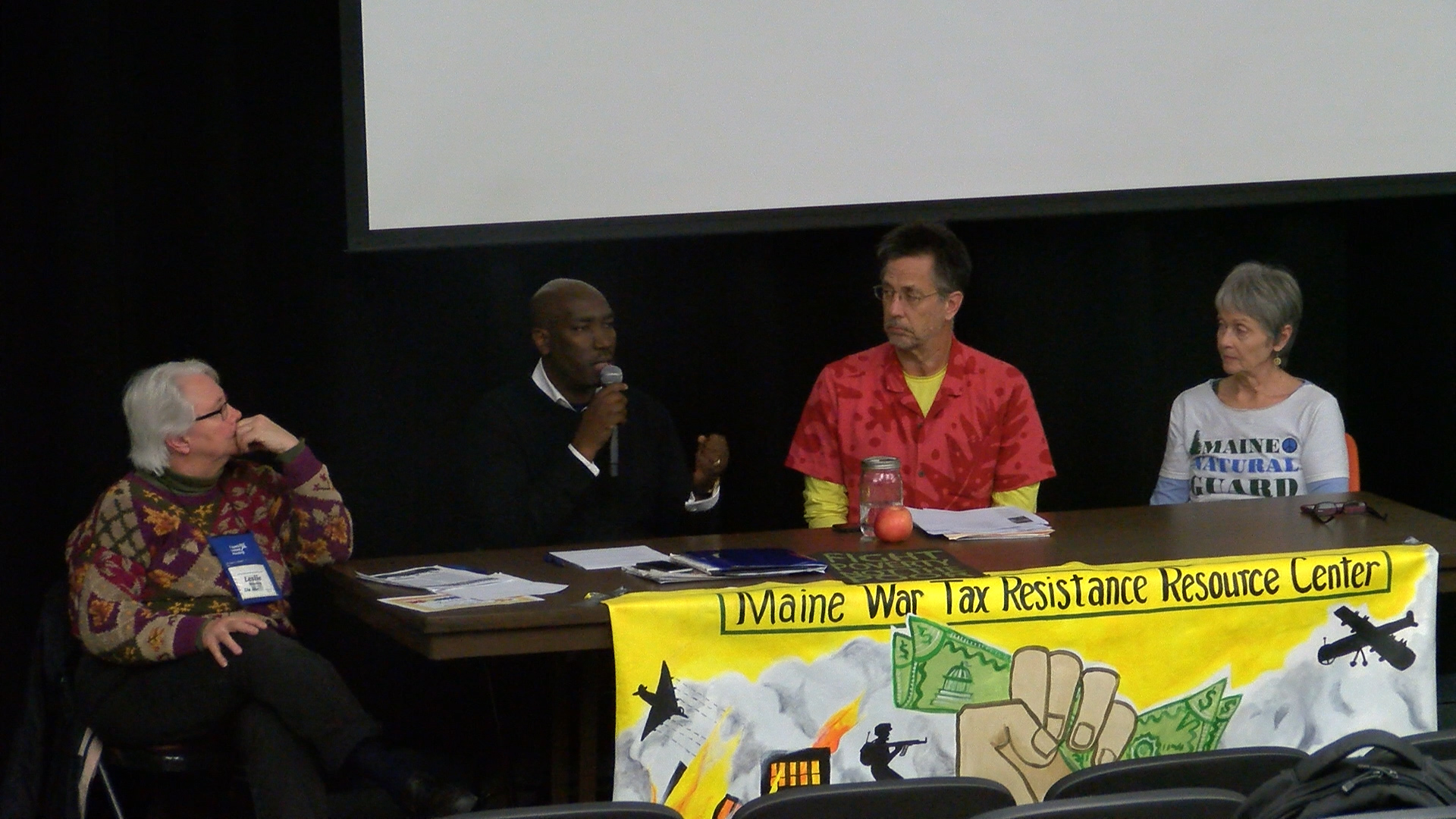
The speakers at the Maine war tax resistance gathering’s main panel, Using Our Money for Our Priorities: Taking Back Our Tax Dollars from War Makers: (left to right) Leslie Manning, Georges Budagu, Bob Klotz, and Lisa Savage. Photo by Ginny Schneider
The program was covered by Portland’s Channel 5, which reaches 70,000 viewers. The video of the panel discussion will be out soon and posted on NWTRCC’s list serve. The program was supported by the Frances Perkins Initiative of USM, with generous financial support from the National Education Association, Maine Veterans for Peace and the MWTRRC.
— Ginny Schneider
Peace Week 2018 San Diego
The Peace Resource Center is grateful to NWTRCC for its $1,200 financial support of Peace Week 2018 San Diego. This was our third year of participating in the annual Campaign Nonviolence Week of Action. Each year, we work with a core group of peace and justice groups in the area, with new groups jumping in as the political climate surges and changes.
Briefly, the PRC sponsored or co-sponsored nine events around the greater San Diego region. This year, we had three events in North County San Diego, improving on the past when we held only one event. Each event included information and literature about war tax resistance and redirection.
The Peace Week events connected with over 350 people in San Diego over 10 days, and with new groups, including Our Revolution North County, Stand For Peace (Vista, CA), Generation Justice, Peace Promotion Momentum Team of City Heights, and Zeitgeist San Diego.
I tutored one person during a WTR workshop held at the PRC. She had engaged with WTR after my Tax Day workshop for People Over Profits in early April and signed onto the NWTRCC website. She is also now interested in joining the board of the PRC. The workshop also engaged the interest of two others, who want one-on-one WTR counseling.
We supported 3 local food businesses with NWTRCC funds to provide food during Peace Week events, and spread the word of WTR and alternative funds at the events.
I refined the Peace Economy presentation to include information on WTR. This was presented at two Peace Economy Workshops during Peace Week.
I was featured on KNSJ (89.1FM) Women’s Issues 9/12 Radio Show with Patricia Law, host. The show featured women peacemakers, and included Nadia Contreras and Julie Corrales of People Over Profits — San Diego.
Local documentary producer Evan Apodaca interviewed me for his new film in progress, ”The Secret City” (working title, in production) after hearing of the Peace Economy workshop. I discussed my war tax resistance during the filming.
A version of this narrative was included in the Fall News letter of the PRC, mailed to 1000 PRC contacts and members in late October.
The PRC created Facebook event pages promoting the Peace Week events and sharing the events of other organizations.
A huge shout-out to the Planning Committee, which provided support and organizing for the 2018 Peace Week happenings around the greater San Diego area. Peace Week San Diego was made
possible through a grant from the National War Tax Resistance Coordinating Committee and to the sweat and toil of dedicated volunteers. Thank you to everyone who supported Peace Week. The work continues.
— Anne Barron
NWTRCC News
Coordinating Committee Decisions at the November Gathering
The National War Tax Resistance Coordinating Committee has formal meetings twice a year on the Sunday morning of our gathering weekends. This is the highest decision-making body of the organization. The November agenda includes setting the budget and objectives for the following year and decisions with proposals and changes. Administrative Committee members, representatives of local groups, individuals who came for the weekend, and consultants made it through a packed agenda in our morning time slot.
We approved a new job description for an Outreach Consultant position. This position combines the work currently done by our Communications & Social Media Consultants. (See next item for more details on this consultant shift.)
We also agreed on a proposal to grant $750 to our affiliate, the Maine War Tax Resistance Resource Center, to support their organizing for tax season and the Maine Youth for Peace Project. (This was funded through our Affiliate Support Fund, which has been advertised in previous issues. If your affiliate would like an application, contact the NWTRCC office.)
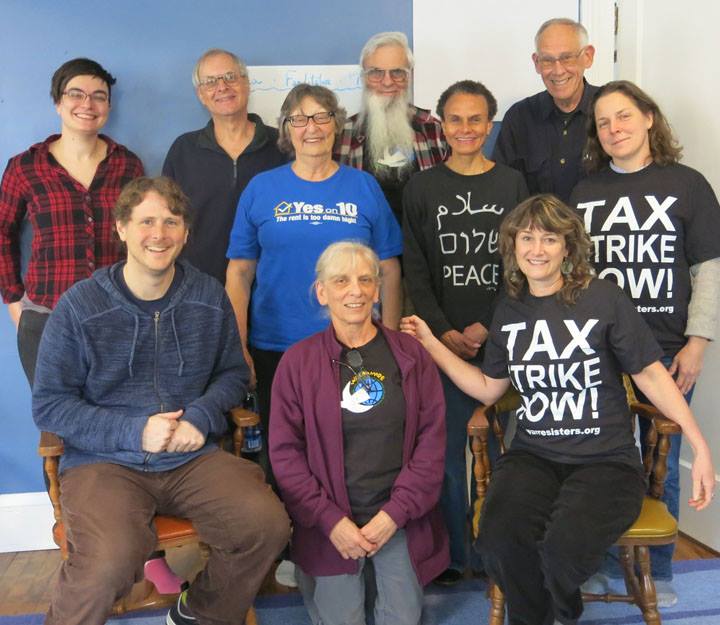
The group after our Sunday morning business meeting. Front row left to right: Lincoln Rice, Ruth Benn, Kima Garrison. Middle row: Cathy Deppe, Maria Smith, Crissy Kirchhoeffer. Back row: Erica Leigh, Robert Randall, Peter Smith, Bill Glassmire. Photo by DeCourcy Squire.
We also approved a Youth Advisory Council, which will create an advisory panel of five young activists that would inform and help the Outreach Committee establish its 3- and 5-year strategic plan. The Outreach Youth Council, which would work with the Outreach Committee and the NWTRCC Coordinator, will be paid a stipend for this assistance. Early in the new year, we will work on a recruitment strategy to bring to this council folks under thirty years old, who are active and engaged with climate change, racial justice, and animal rights; as well as people who identify as queer/LGBT and people from other oppressed communities.
We endorsed the United National Antiwar Coalition’s (UNAC) call for a mass mobilization in Washington, D.C., on Saturday, March 30. Additional actions will take place on April 4 at the opening of the NATO meeting. You can find further information on the action at no2nato2019.org.
We received our final reports from our Communications Consultant Erica Leigh and Social Media Consultant Sarah Mueller. Also, thank you to Erica, Rick Bickhart, Anne Barron, and Daniel Woodham for agreeing to be on the hiring committee for our new Outreach Consultant position.
— Lincoln Rice
More on Consultant Changes
In my November consultant report, I shared that I’m leaving my consultant role at NWTRCC at the end of the year. It was a tough decision but I’m looking forward to doing some work that’s closer to home. I’m glad to leave NWTRCC in competent and steady hands with Lincoln.
Sarah Mueller also announced in October that she was hired for a full-time job to replace her many freelance commitments. She finished her work for NWTRCC at the end of November. I’ll cover social media at least through the end of the year. If hiring takes longer than expected, I’ll make sure we have some posts in place to carry us through early 2019.
The Outreach Consultant will take on most aspects of both the Communications and Social Media positions, with newsletter editing reverting back to the coordinator.
The job opening announcement went out over NWTRCC’s email lists and was posted on our website and on the Idealist job website in mid-November. The hiring committee is at work as we go to press on interviewing candidates for this position. We hope to have someone in place as close to the beginning of January as possible!
– Erica Leigh
Help keep NWTRCC Strong and Growing!
Nominations Open for NWTRCC’s
Administrative Committee (AdComm)
The AdComm gives oversight to business operations, helps plan two gatherings each year, keeps in touch with consultants between meetings, and meets face-to-face at the May and November gatherings and by phone in February and August. We need to fill two seats, and new members will be selected from nominees at the May 2018 meeting. They serve as alternates for one year and full members for two years; travel to meetings is paid for full members and alternates filling in for full members who cannot attend. Each nominee will receive a nomination letter from the NWTRCC office with more details about what’s involved as a member of this important committee.
Call, email, or mail your nomination(s) to
NWTRCC,
PO Box 5616, Milwaukee, WI 53205
800-269-7464 or nwtrcc@nwtrcc.org
Deadline: March 15, 2018
Reach out to your religious communities for end-of-year donations!
Now is a great time to reach out to your religious community for an end-of-year donation to NWTRCC.
Ask your community to support anti-war work and to support you as a war tax resister with a contribution to our work!
See nwtrcc.org/donations for ways to give.
A Special Thank You to Lakeside Press
Lakeside Press in Madison, Wisconsin has printed the NWTRCC newsletter since the mid-1980s.
Sadly, they recently announced that they are closing at the end of 2018, after 37 years in operation.
We’re so grateful for their many years of reliable, excellent, reduced-rate printing for us.
Thank you, Jerry and Ralph — we wish you all the best.
PROFILE
However Small It May Seem
By Joshua Weresch
To the War Resisters’ League, Erica Leigh at NWTRCC, Cale Weissman, who wrote a great article on war resistance for The New Republic, the good folks over at Popular Resistance, and, across the Pond, the same at Conscience Online:
Good evening. I hope this finds you all keeping well. My name’s Joshua Weresch; I’m a song-writer and settler, born and living here in Hamilton, Ontario on Anishinaabeg land with my wife, son, and daughters. My wife and I and family are members at Central Presbyterian Church, here in town, and I’ve written a few letters to the governing church body’s newspaper, the Presbyterian Connection, and to my local church, asking that its padres resign, that it take down its national and military regimental flags.
I wanted to write to you and thank each of you for what you’ve done and are doing in the way of war tax resistance. A few years back, I withheld the portion of my federal tax (as a public-school supply-teacher) that was heading toward national defence and re-directed it toward a peace tax fund that was and is being maintained by Conscience Canada. The year after that, the Canada Revenue Agency simply took the amount it was ‘owed’ from my subsequent return’s balance. It slowed things down, which was alright, and I did get a chance to write to the Finance Minister, Bill Morneau, at the time and hear from him how I had to pay income tax and could not re-direct my taxes without the support of a law from Parliament. I will continue, I believe, to exercise this tactic in the coming year, as the $15-billion arms deal between Canada and Saudi Arabia has not yet been cancelled, at the very least, and we continue, on a national level, to be seemingly unaware of how to ‘love our enemies’. Perhaps it is impossible for institutions to ‘love’ and it can be the province only of persons to love one another, deeply and from the heart.
Keep on writing and fighting and loving and praying for one another, especially for one’s enemies. Thanks, again, for all you’re doing, however small it may seem.
Kindly, Josh
More than a Paycheck
Editor Erica Leigh
Production Rick Bickhart
Printing and Mailing
Lakeside Printing Cooperative, Madison, Wisc.
Printed on Recycled Paper
More Than a Paycheck: Refusing to Pay for War is a bimonthly publication of the National War Tax Resistance
Coordinating Committee, a clearinghouse and resource center for the conscientious war tax resistance
movement in the United States. NWTRCC is a coalition of local, regional and national affiliate groups working on war tax related issues.
NWTRCC sees poverty, racism, sexism, homophobia, economic exploitation, environmental destruction and militarization of law enforcement as integrally linked with the militarism which we abhor. Through the redirection of our tax dollars, NWTRCC members contribute directly to the struggle for peace and justice for all.
Subscriptions are $15 per year.
NWTRCC
P.O. Box 5616, Milwaukee, WI 53205
(800) 269‒7464
(262) 399‒8217
nwtrcc@nwtrcc.org
social media: socialmedia@nwtrcc.org
newsletter: wartaxresister@nwtrcc.org
www.nwtrcc.org

